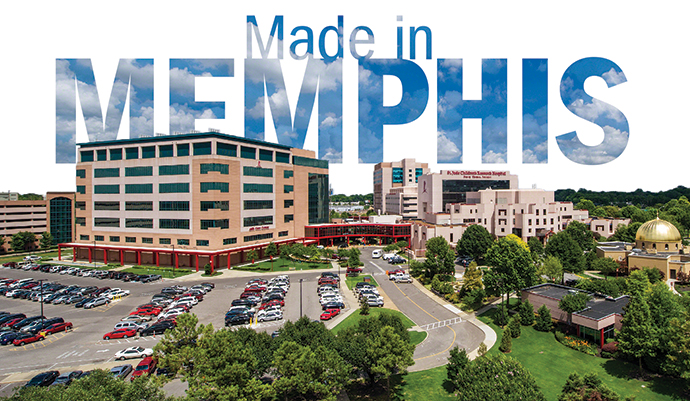Early next year, a three-person Memphis startup called Somavac Medical Solutions will launch its first product. The lightweight, wearable, post-operative drain, branded the Somavac 100, is designed to add comfort and dignity to the process of recovering from breast removal surgery.
Post-operative drains suction and store fluids resulting from surgical wounds. Fluids can lead to infections if allowed to build up beneath the skin. The current system, known as the JP drain, hails from the 1960s and consists of clog-prone tubes attached to manual suction bulbs that also serve as fluid reservoirs.
"I interviewed breast cancer survivors who had up to six drains in their body and really suffered for it," says Dr. Esra Roan, who founded Somavac in 2016. "We decided we had to find a better solution."
Somavac created a motorized version that’s battery-powered and adjusts itself to maintain appropriate pressure. Fluid flows into discreet reservoirs that are easily detached for disposal.
"It’s efficient, sanitary, lightweight and wearable, and designed to improve the patient’s experience at home while also impacting the healing process," says Roan.
Innova Memphis, a venture capital fund, has invested hundreds of thousands of dollars in Somavac. "What initially attracted us to them," says Innova partner Jan Bouten, "is the problem they’re trying to solve. They’re not just making a technical advancement in this field, but also bringing a lot of dignity to the patients that have had these very difficult surgeries."
Memphis continues to be one of the world’s medical device capitals. Major Memphis manufacturers include Smith & Nephew and Microport, Medtronic, Wright Medical Group and Olympus. Such legacy firms have a record of spinning off startups, some filtered through accelerator programs such as ZeroTo510 at the Memphis Bioworks Foundation.
"We tell people all the time," says Chris West, ZeroTo510’s president, "that if you think you have the next Facebook, go to Silicon Valley. If you’re in medical device innovation, you should be in Memphis."
A Big Little Town
Memphis calls itself the country’s second-largest hub for medical device manufacturers, after Warsaw, Indiana. A 2015 study commissioned by the Memphis Economic Development Growth Engine (EDGE) found that the industry creates $2.7 billion in annual economic impact while employing 6,500 people directly and another 10,000 indirectly.
People tied to the industry will invariably tell you that the FedEx SuperHub adjacent to Memphis International airport is a crucial asset — urgently needed medical devices shipped by midnight can arrive in an OR anywhere in the country as early as the following morning.
"FedEx is a huge part of it," says Roy Smith, a former Smith & Nephew vice president who is now executive director of the Greater Memphis Medical Device Council (GMMDC). But the industry’s growth in Memphis began long before FedEx arrived in the 1970s.
"It started here in Memphis in 1934," Smith tells Site Selection, "when J. Don Richards started Richards Manufacturing Company."
Richards begat Medtronic and Wright Medical Group. "Ever since then," he says, "we’ve been spinning off entrepreneurs who want to start their own businesses. It just goes on and on."
With $1.3 million in funding (largely from Innova and Memphis-based MB Venture Partners) plus a three-month tenure at ZeroTo510, Somavac has roots throughout the Memphis ecosystem. Roan is a former associate professor in biomedical engineering at the University of Memphis, part of a medical research establishment that includes renowned institutions such as St. Jude Children’s Research Hospital.
"We’ve been very fortunate to be here because of the accelerator and the dollars we’ve been able to raise," Roan says "We’re technical people, and we needed to learn the business aspects of launching a company."
Named one of the nation’s Top 25 accelerators for three years running, ZeroTo510 has helped to launch six medical device companies with products now on the market. "One of our stated goals," says West, "is to have companies that graduate from our program set up shop here in Memphis."
Memphis, says Roan, is "a little big town. Everyone knows everyone, and everywhere you turn there’s someone who works in the industry. So, when we have some question, we can get the answer quickly.
"We don’t have the urge," she says, "to be anywhere else."

